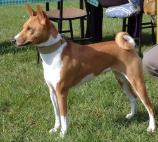
This is a placeholder text
Group text
by Bhaugh on 15 November 2012 - 02:11
I can only comment by experience. Ive taken in so many rescue dogs that were on kibble with some's teeth rotting out of their head. Since I dont feed much kibble with 2-3 months of being on raw, their teeth and breath was nice and clean.
Factually though most kibble is high carb weather it be veggies or grain and does stick to teeth. Sure it wasnt the rawhid and bones that was cleaning the teeth? Does the food have pre0probiotics in it?
Barb
Factually though most kibble is high carb weather it be veggies or grain and does stick to teeth. Sure it wasnt the rawhid and bones that was cleaning the teeth? Does the food have pre0probiotics in it?
Barb
by Hundmutter on 15 November 2012 - 07:11
Barb I really don't remember if the foods had a pre/probiotic element in them,
its too long ago. Because it is long ago, my guess is probably not.
At the time I wasn't so interested in the effects of kibble v. wet on teeth. My
'experimental research' was about the 'completeness' of their diet.
They were on either Eukenuba or Nutro; with added Butchers Tripe.
Now since all three claimed to be 'complete' diets, and I am of the school of
opinion that says "If a company's nutritionists have developed a complete
food, you shouldn't mess with it by combining it with a 2nd complete food",
I really wanted to change them onto one, rather than a mix of two, foods.
Plus the other disadvantages of canned - the fluid content you pay for; the
pile of smelly cans (before we had a recycling outlet). Also it would be easier
to identify digestive problems on ONE food ...
Yes they all had access to chews, including bones, under the previous
regime and all I did was step that up some. I improved both frequency and
product type, but over a fairly long period of time - longer than it took to see
results in dentition. [We also changed the food itself eventually, I'd never been
overkeen on Euk]...
It has always seemed to me that the kibble doesnt stick to the teeth too much
because they dont chew too much. Wet food hangs around longer in their
mouth, maybe. Honestly don't think you can go by the state of rescue dogs teeth -
not enough is usually known about exactly what they have been eating, some
have perfectly good teeth despite a terrible diet. JMO.
its too long ago. Because it is long ago, my guess is probably not.
At the time I wasn't so interested in the effects of kibble v. wet on teeth. My
'experimental research' was about the 'completeness' of their diet.
They were on either Eukenuba or Nutro; with added Butchers Tripe.
Now since all three claimed to be 'complete' diets, and I am of the school of
opinion that says "If a company's nutritionists have developed a complete
food, you shouldn't mess with it by combining it with a 2nd complete food",
I really wanted to change them onto one, rather than a mix of two, foods.
Plus the other disadvantages of canned - the fluid content you pay for; the
pile of smelly cans (before we had a recycling outlet). Also it would be easier
to identify digestive problems on ONE food ...
Yes they all had access to chews, including bones, under the previous
regime and all I did was step that up some. I improved both frequency and
product type, but over a fairly long period of time - longer than it took to see
results in dentition. [We also changed the food itself eventually, I'd never been
overkeen on Euk]...
It has always seemed to me that the kibble doesnt stick to the teeth too much
because they dont chew too much. Wet food hangs around longer in their
mouth, maybe. Honestly don't think you can go by the state of rescue dogs teeth -
not enough is usually known about exactly what they have been eating, some
have perfectly good teeth despite a terrible diet. JMO.
Contact information Disclaimer Privacy Statement Copyright Information Terms of Service Cookie policy ↑ Back to top




